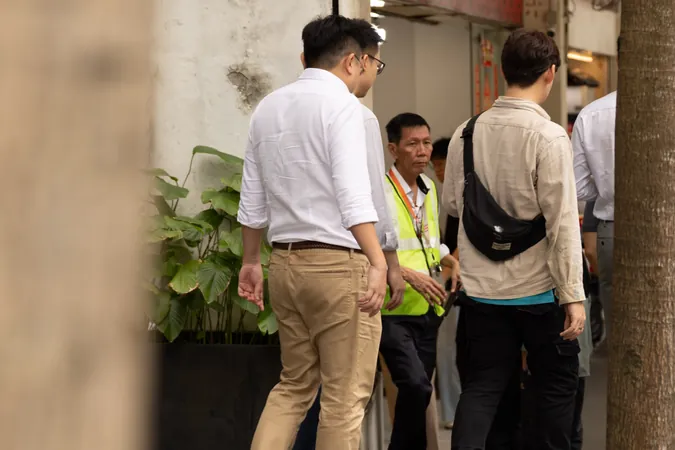
The Hidden Cost of Job Stability: Why Public Servants in Singapore Choose to Stay
2025-03-24
Author: Wei Ling
In the bustling corridors of Singapore's civil service, a paradox unfolds. Many view the public sector as a bastion of job security, a safe haven amid the turbulence of the global economy. Yet, as increasing numbers of public servants grapple with stagnation and disillusionment, the true cost of such stability becomes apparent.
Take, for instance, Alan, bound for six years by a scholarship bond to the civil service. Initially, it promised a future filled with stability, prestige, and financial security. However, as the years rolled by, that golden ticket began to resemble a gilded cage. Leaving the position wasn’t an option he could easily entertain due to the hefty financial penalties associated with breaking his bond. Surprisingly, as the final months approached, it wasn’t just the financial burden weighing on his mind, but a growing realization: did he even want to leave?
Alan, described as affable yet introspective, felt trapped in a system that favored order over originality, echoing the silent dispute many public servants face—sacrifice ambition for financial stability. This sentiment isn’t unique to Alan; it resonates with countless individuals working in Singapore’s civil service.
Inside the public sector, a prevailing culture of compliance often overshadows creativity and innovation. Barry, a colleague of Alan's, initially entered the civil service with bright-eyed enthusiasm, engaging in projects that sparked joy. However, over time, the burdensome protocols and the weight of bureaucratic layers stifled his innovative spark, leading him to reminisce about his exciting early days with a sense of longing and frustration.
This theme of tension—between the safety offered by public service and the ambition for a more fulfilling career—is pervasive among many in this sector. It often leads to a mid-career crisis, as highlighted by Barry, who found himself navigating rigid leave policies that clashed with his personal life while also feeling overwhelmed by the growing monotony of his role.
Daniel, a Major in the military, also experienced the paradox of stability. As he climbed the ranks, he achieved a high level of job security but had to sacrifice family time, leading him to wonder if the sacrifices were worth it. For him, the decision to leave was not simply a career move but a life-changing choice made more perilous by the demands of family responsibility.
These realities outlined by Alan, Barry, and Daniel paint a picture of a workforce at odds with itself—juggling the desire for stability against the yearning for personal and professional fulfillment. The leap into the private sector is daunting but often seen as necessary. Daniel transitioned to property investment, ultimately discovering greater work-life balance and joy in his daily life, a stark contrast to his previous experiences in the military.
However, the transition to the private sector is not always a fairy tale. Barry's initial excitement was soon replaced by chaos in a startup environment rife with uncertainty and lack of structure. What became evident to both Barry and many workers is that freedom doesn’t always equate to fulfillment and that the grass is not always greener on the other side.
For Alan, returning to the government sector was not a step back but rather a means to have a fulfilling career on his terms, demonstrating that sometimes the best path is one of familiar territory but with a new perspective.
As both Alan and Barry navigate their respective journeys, they come to terms with a vital realization: the iron rice bowl—while symbolizing safety—can also represent stagnation. The true essence of job satisfaction lies not solely in security but in the ability to adapt, innovate, and grow.
In a rapidly evolving job market, upskilling is more critical than ever. Without embracing continuous learning and self-improvement, even the most stable of positions can lead to obsolescence.
Ultimately, their stories underline a more significant truth: when job security becomes synonymous with complacency, it may be time to reassess one's choices. The courage to leap from the safety of a familiar role into the unknown can be daunting, but it may also be the key to unlocking a fulfilling career path.
So, what’s the takeaway? The real risk may not be leaving a stable job for the unknown but rather remaining stagnant in a role that no longer nurtures your ambition and passion. As the narrative unfolds across Singapore, many public servants find themselves at a crossroad, yearning for something more—security, yes, but also the deep-seated fulfillment that comes from meaningful work.


 Brasil (PT)
Brasil (PT)
 Canada (EN)
Canada (EN)
 Chile (ES)
Chile (ES)
 Česko (CS)
Česko (CS)
 대한민국 (KO)
대한민국 (KO)
 España (ES)
España (ES)
 France (FR)
France (FR)
 Hong Kong (EN)
Hong Kong (EN)
 Italia (IT)
Italia (IT)
 日本 (JA)
日本 (JA)
 Magyarország (HU)
Magyarország (HU)
 Norge (NO)
Norge (NO)
 Polska (PL)
Polska (PL)
 Schweiz (DE)
Schweiz (DE)
 Singapore (EN)
Singapore (EN)
 Sverige (SV)
Sverige (SV)
 Suomi (FI)
Suomi (FI)
 Türkiye (TR)
Türkiye (TR)
 الإمارات العربية المتحدة (AR)
الإمارات العربية المتحدة (AR)